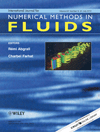
INTERNATIONAL JOURNAL FOR NUMERICAL METHODS IN FLUIDS
Scope & Guideline
Navigating the Complexities of Fluid Flow with Precision
Introduction
Aims and Scopes
- Numerical Methods Development:
The journal emphasizes the creation and refinement of numerical techniques, including finite element methods, finite volume methods, and spectral methods, aimed at improving the accuracy and efficiency of fluid dynamics simulations. - Fluid-Structure Interaction:
Research on the interaction between fluid flows and solid structures is a core area, encompassing methodologies that address coupling challenges and effects of fluid dynamics on structural integrity. - Multiphase Flow Modeling:
The journal explores methods for simulating multiphase flows, including interfaces and interactions between different fluid phases, which are critical in many engineering and natural processes. - Turbulence and Turbulent Flow Simulation:
A significant focus is placed on turbulence modeling and simulations, with contributions that investigate the behavior of turbulent flows and the development of advanced turbulence models. - Applications in Engineering and Environmental Sciences:
The journal serves as a platform for applying numerical methods to real-world problems in engineering and environmental sciences, such as aerodynamics, hydrodynamics, and environmental fluid mechanics. - Machine Learning and AI Integration:
There is a growing interest in integrating machine learning and artificial intelligence techniques into numerical methods, enhancing predictive capabilities and optimization processes in fluid dynamics.
Trending and Emerging
- Artificial Intelligence and Machine Learning:
The integration of AI and machine learning techniques in numerical methods is gaining momentum, with researchers exploring their potential to enhance simulation accuracy, optimize designs, and automate processes. - Advanced Turbulence Modeling:
There is a marked increase in publications focusing on advanced turbulence models, including large eddy simulations and machine learning-based turbulence predictions, highlighting a move towards more accurate representations of turbulent flows. - Hybrid Numerical Approaches:
The trend towards hybrid methods that combine different numerical techniques (e.g., finite volume with lattice Boltzmann methods) is becoming more prominent, reflecting a need for more robust solutions to complex fluid dynamics problems. - Real-Time and High-Performance Computing Applications:
Research is increasingly focused on developing algorithms that leverage high-performance computing and real-time simulation capabilities, particularly for applications in engineering and environmental monitoring. - Complex Boundary Conditions and Interfaces:
Studies addressing the challenges of complex boundary conditions and interface tracking in multiphase flows are emerging, driven by the need for accurate simulations in practical applications.
Declining or Waning
- Traditional Computational Approaches:
There appears to be a waning interest in conventional computational fluid dynamics methods that do not incorporate modern enhancements or hybrid approaches, as researchers increasingly adopt more sophisticated and integrated techniques. - Simplistic Turbulence Models:
Basic turbulence models, such as those relying solely on Reynolds-averaged Navier-Stokes equations, are being overshadowed by more complex and accurate models, indicating a shift towards a preference for advanced turbulence modeling techniques. - Static Mesh Techniques:
Research focusing on fixed or static mesh approaches is decreasing as adaptive and dynamic mesh methods gain traction, providing better solutions for complex flow scenarios. - Single-Phase Flow Studies:
There is a noticeable decline in the publication of studies exclusively focused on single-phase flows, as the field increasingly emphasizes multiphase interactions and their complexities.
Similar Journals
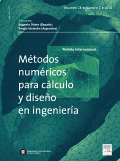
Revista Internacional de Metodos Numericos para Calculo y Diseno en Ingenieria
Exploring New Frontiers in Numerical TechniquesRevista Internacional de Metodos Numericos para Calculo y Diseno en Ingenieria is a prominent academic journal dedicated to the dissemination of innovative research and methodologies in the fields of applied mathematics and engineering. Published by SCIPEDIA S L in Spain, this journal has been an essential resource for researchers since its inception in 1987, transitioning to an Open Access model in 2016 to enhance accessibility and foster collaboration among professionals and academics globally. Currently indexed in Scopus, it holds a Q4 category designation in both applied mathematics and miscellaneous engineering fields for 2023, reflecting its focus on advancing numerical methods to solve engineering problems. Despite ranking at the lower percentile, it serves as a vital platform for emerging scholars and practitioners aiming to contribute to cutting-edge developments in numerical techniques and engineering design. The journal's commitment to providing a forum for new ideas makes it an invaluable asset for students, researchers, and industry professionals seeking to stay abreast of advancements in the discipline.
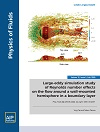
PHYSICS OF FLUIDS
Navigating the Depths of Fluid MechanicsPHYSICS OF FLUIDS is a premier journal published by AIP Publishing that serves as a vital resource for the fluid mechanics community. With an impressive impact factor and a consistent ranking in the Q1 quartile across multiple related disciplines—including Computational Mechanics, Condensed Matter Physics, Fluid Flow and Transfer Processes, Mechanical Engineering, and Mechanics of Materials—this journal is renowned for disseminating high-quality research in the dynamic field of fluid dynamics. Covering a wide range of topics, from fundamental fluid mechanics to advanced computational modeling, PHYSICS OF FLUIDS plays a crucial role in advancing understanding and fostering innovation in both academic and industrial applications. With its strong reputation and significant readership, this journal is essential for researchers, professionals, and students seeking to stay updated on the latest developments in fluid physics.

COMPUTATIONAL MATHEMATICS AND MATHEMATICAL PHYSICS
Exploring Complex Problems with Precision and InsightCOMPUTATIONAL MATHEMATICS AND MATHEMATICAL PHYSICS is a prestigious journal published by PLEIADES PUBLISHING INC, dedicated to advancing the fields of computational mathematics and mathematical physics. With an ISSN of 0965-5425 and an E-ISSN of 1555-6662, the journal has established its importance within the academic community since its inception in 1985. It is classified in the third quartile (Q3) for computational mathematics in 2023, and while currently it does not offer open access options, it remains a valuable resource for researchers seeking to disseminate their findings and engage with cutting-edge developments in the field. The journal encompasses a broad spectrum of topics, including numerical analysis, applied mathematics, and the intersection of physics and computational techniques, highlighting its relevance in addressing complex problems in both theoretical and applied contexts. Scholars will find a platform that not only promotes rigorous research but also encourages collaboration and innovation within the scientific community.

Computational Particle Mechanics
Pioneering Research in Fluid Dynamics and Structural EngineeringComputational Particle Mechanics, published by SPRINGER INTERNATIONAL PUBLISHING AG, is a leading journal dedicated to advancing knowledge in the interdisciplinary fields of computational mechanics, civil engineering, and fluid dynamics. With an impressive impact factor reflecting its high-quality research publications, this journal maintains a strong presence in the academic community with a Q1 ranking in categories such as Civil and Structural Engineering, Computational Mechanics, and Numerical Analysis as per the latest 2023 evaluations. Researchers and professionals benefit from the journal's commitment to open-access options, promoting wider dissemination of groundbreaking studies. Operating under the Swiss publishing house since 2014, Computational Particle Mechanics aims to foster innovation through the exploration of particle-based methods and simulations, making significant contributions to methodologies within computational mathematics and modeling. As the journal continues to evolve until its converged years end in 2024, it stands as a vital resource for those looking to enhance their expertise in dynamic modeling and simulation techniques.
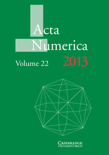
ACTA NUMERICA
Where Mathematics Meets Innovative Solutions.ACTA NUMERICA, published by Cambridge University Press, stands as a premier journal in the fields of Mathematics and Numerical Analysis since its inception in 1992. With an impressive Scopus ranking that places it in the 99th percentile and a prestigious Q1 category status in both Mathematics (miscellaneous) and Numerical Analysis for 2023, it has established itself as a leading platform for cutting-edge research. The journal's scope encompasses a wide range of numerical methods and computational techniques that address complex mathematical problems, making it an essential resource for researchers, professionals, and students alike. Although it does not provide Open Access, its commitment to quality and innovation in the mathematical sciences continues to attract submissions from around the globe. Published in the United Kingdom, ACTA NUMERICA remains a vital channel for disseminating significant advancements in numerical methodologies.

Computational Methods for Differential Equations
Empowering Scholars with Cutting-Edge Computational MethodsComputational Methods for Differential Equations is a prominent academic journal dedicated to the exploration and application of computational techniques in the realm of differential equations. Published by UNIV TABRIZ, this open-access journal has been providing unrestricted access to groundbreaking research since 2013, making it a valuable resource for the global academic community, particularly in Iran. It has carved out a niche within the fields of Algebra and Number Theory, Applied Mathematics, and Numerical Analysis, maintaining a Q3 quartile ranking in 2023 across these categories. Researchers, professionals, and students alike will find the journal's commitment to disseminating innovative computational methodologies essential for advancing knowledge and developing robust solutions to complex mathematical problems. With its ISSN 2345-3982 and E-ISSN 2383-2533, the journal ensures wide visibility and accessibility, serving a diverse audience and promoting scholarly discourse.
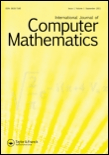
INTERNATIONAL JOURNAL OF COMPUTER MATHEMATICS
Fostering Insightful Research in Mathematical ComputingThe International Journal of Computer Mathematics, published by Taylor & Francis Ltd, stands as a prominent forum for the dissemination of novel research in the intersection of mathematics and computing. Established in 1964, this journal has evolved significantly, contributing to the field with robust methodologies and innovative applications. It holds notable rankings within Scopus, classified as Q2 in Applied Mathematics and Q3 in both Computational Theory and Mathematics and Computer Science Applications for 2023, highlighting its pivotal role in advancing academic discourse. Though it is not an open-access journal, its rigorous peer-review process ensures that published articles maintain the highest scholarly standards, making it a reliable source for cutting-edge research. Researchers, professionals, and students alike will find valuable insights and advancements that push the boundaries of mathematical applications in computing, solidifying its importance within the mathematical and computer science communities.
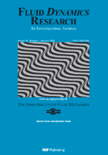
FLUID DYNAMICS RESEARCH
Pioneering Discoveries in Fluid Flow and Transfer ProcessesFLUID DYNAMICS RESEARCH, published by IOP Publishing Ltd, is a pivotal journal dedicated to advancing the understanding of fluid dynamics through interdisciplinary research that spans several domains including mechanical engineering and physics. With an ISSN of 0169-5983 and E-ISSN 1873-7005, this journal provides a vital platform for researchers aiming to disseminate new findings and theoretical advancements in fluid flow and transfer processes. As of 2023, FLUID DYNAMICS RESEARCH holds a commendable position within the academic community, ranked Q3 in fluid flow and transfer processes, mechanical engineering, and miscellaneous physics and astronomy categories. The journal showcases a diverse array of articles that not only inspire collaboration among professionals and students but also ensure that theoretical and experimental studies are accessible for further development in the field. Operating from the United Kingdom, the journal offers a unique opportunity for scholars worldwide to contribute to the vibrant community dedicated to understanding the complexities of fluid dynamics, even as it anticipates converging its years of research from 1986 to 2024.
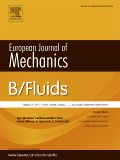
EUROPEAN JOURNAL OF MECHANICS B-FLUIDS
Unveiling the Mysteries of Fluid BehaviorThe EUROPEAN JOURNAL OF MECHANICS B-FLUIDS, published by Elsevier, is a prominent journal in the field of fluid mechanics, addressing the theoretical and experimental aspects of fluid behavior. Since its inception in 1990, this journal has consistently fostered a robust academic dialogue, maintaining a significant impact evidenced by its Q2 ranking in both Mathematical Physics and Physics and Astronomy categories as of 2023, placing it among the top publications in these disciplines. Researchers and professionals focusing on fluid dynamics will find a wealth of knowledge in its articles, which span broad topics pertinent to real-world applications as well as fundamental theories. While the journal is not open access, it offers critical insights that shape ongoing studies in fluid mechanics, making it an invaluable resource for anyone looking to deepen their understanding of the field. Located in the innovative environment of Amsterdam, Netherlands, the journal serves as a nexus for cutting-edge research and collaboration globally.

Advances in Applied Mathematics and Mechanics
Exploring the Frontiers of Applied Mathematics and MechanicsAdvances in Applied Mathematics and Mechanics is a premier academic journal published by GLOBAL SCIENCE PRESS that focuses on the latest research and innovative developments in the fields of applied mathematics and mechanical engineering. Since its inception in 2009, this journal has consistently contributed to the advancement of knowledge, garnering a respectable Q2 ranking in both Applied Mathematics and Mechanical Engineering categories, reflecting its significance in enhancing scientific discourse. With an impactful reach, as evidenced by its Scopus rankings, this journal hosts cutting-edge research, theoretical advancements, and practical applications that serve as invaluable resources for researchers, professionals, and students alike. While it operates under a subscription model, the accessibility of vital research findings is critical for driving innovation within these interrelated disciplines. The journal’s scope encompasses a broad range of topics, from computational methods to engineering applications, positioning it as a crucial platform for interdisciplinary collaboration and knowledge sharing in an ever-evolving academic landscape. For prospective authors and readers, Advances in Applied Mathematics and Mechanics stands as a key contributor to confidently navigating the nexus of applied mathematics and mechanics.